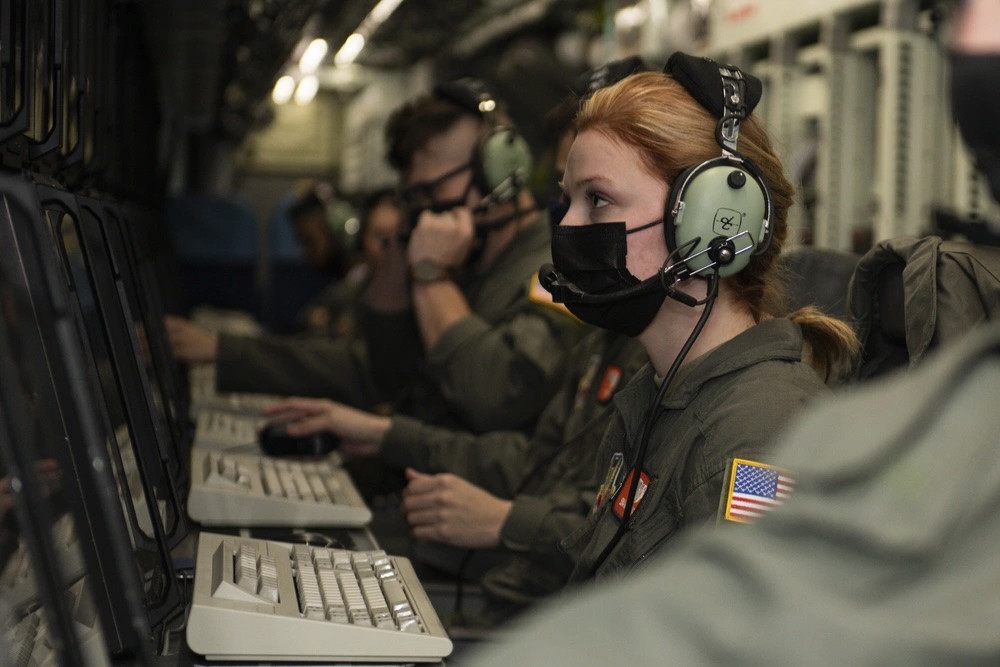The U.S. military needs more Chinese language speakers as it prepares for a possible conflict in the Pacific. As part of that push, the 70th Intelligence, Surveillance, and Reconnaissance Wing (ISRW) is teaching eight of its Arabic- and Pashto-speaking Airmen how to speak Chinese.
“[I]t’s extremely beneficial to take someone that has that experience and can transition from one language to another, as opposed to taking someone that’s brand new and fresh,” Master Sgt. John-Marvin Mercer, command language program manager for the 70th ISRW, said in a Jan. 5 press release.
Training Airmen in a new language is not new, but usually that training happens at the Defense Learning Institute Foreign Language Center in Monterey, Calif.; or at Defense Language Institute-East in Arlington, Va. However, there are only so many spots at those schools, and in the meantime there is an “urgent demand” for Chinese-speaking cryptologic language analysts, Mercer told Air & Space Forces Magazine.
CLAs like the eight students from the 70th ISRW translate and analyze foreign language communications and signals for intelligence purposes. CLAs work on the ground or aboard aircraft such as the RC-135 family of ISR jets or the EC-130H, a turboprop electronic warfare plane. The 70th ISRW has geographically separated units at 28 locations around the world, and it often works with the National Security Agency.
“Our cryptologic warriors are critical in providing Joint Force commanders with knowledge to help make advantageous decisions on the battlefield,” wing commander Col. Celina Noyes said in the release.

As missions change, the demand for some languages grows while the demand for others shrinks. Five of the eight Airmen taking part in the 70th ISRW’s retraining program speak various dialects of Modern Standard Arabic, while the other three have backgrounds in Pashto, but there is no longer as great a demand for CLAs with those language skills.
“A lot of them are doing administrative jobs, or serving as program managers,” Mercer said. “So, if we can re-language them, it gives them that opportunity to serve in that capacity. We have more than enough Russian and Chinese missions to go around.”
Instead of shipping them to California or Virginia, the Ft. Meade, Md.-based 70th ISRW worked with the Berlitz Odenton Language Center located in nearby Odenton, Md., to stand up a 63-week Chinese-Mandarin course. The wing received $331,000 from the Air Combat Command intelligence directorate to fund the program, which should save the Air Force about $1.5 million due in part to the reduced permanent change of station (PCS) costs.
The new program has quality of life benefits too, since it allows Airmen based at Fort Meade to stay in the area to take care of family, said Staff Sgt. Lauren Rickard, a 29th Intelligence Squadron multi-disciplined language analyst and a current student.
“This program shows that there are other more cost-efficient locations where [the Air Force] can send its members to learn a new language, increasing the workforce’s flexibility,” she said in the release. “This could also benefit other linguists at other bases so that the Air Force does not need to pay to have Airmen PCS.”
Mercer pointed out that the 543rd Intelligence, Surveillance, and Reconnaissance Group previously conducted an in-person Russian course through a contractor in San Antonio, Texas, and the 70th ISRW had a Russian course at Ft. Meade in 2023, but this may be the first local, in-person Chinese language course in the Air Force.
The eight Airmen started the course on Aug. 28. For a total of 63 weeks (about 14 months) the full-time students will hit the books to become proficient in what Mercer described as one of the most difficult languages for English speakers to learn.
“Learning a language in general is very difficult,” he said. “I don’t envy what they must go through.”
Once the initial eight students graduate, they may be reassigned to one of the 70th ISRW’s 28 geographically separated units. Mercer said his program is working on setting up another Chinese re-language course, though it depends on how many volunteers pass Headquarters Air Force’s vetting process. The more, the better from a security perspective, Rickard said.
“Without sufficient Chinese linguists, adversaries could easily exploit that intelligence gap, and we could be caught unaware and lose assets because we were unaware of an impending attack,” she said.
"course" - Google News
January 08, 2024 at 08:00PM
https://ift.tt/wGKdt68
Intel Wing Starts New Course to Train Chinese Speakers Faster - Air & Space Forces Magazine
"course" - Google News
https://ift.tt/rAZa6nE
https://ift.tt/WDjlZro
Bagikan Berita Ini














0 Response to "Intel Wing Starts New Course to Train Chinese Speakers Faster - Air & Space Forces Magazine"
Post a Comment